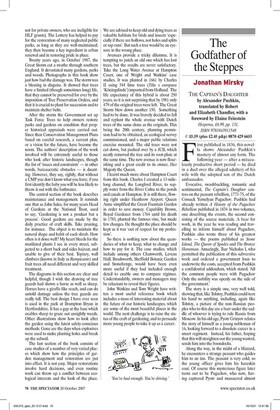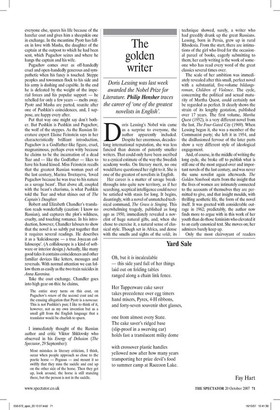The Godfather of the Steppes
Jonathan Mirsky THE CAPTAIN'S DAUGHTER by Alexander Pushkin, translated by Robert and Elizabeth Chandler, with a foreword by Elaine Feinstein Hesperus, £6.99, pp. 131, ISBN 9781843911548 © £5.59 (plus £2.45 p&p) 0870 429 6655 First published in 1836, this novella shows Alexander Pushkin's mastery of almost any form. The following year — after a miraculously productive short period — he died in a duel over the alleged adultery of his wife with the adopted son of the Dutch ambassador.
Evocative, swashbuckling, romantic and sentimental, The Captain's Daughter centres on the peasant rebellion, 1773-75, of the Cossack Yemelyan Pugachov. Pushkin had already written A History of the Pugachov Rebellion published in 1834 in two volumes, one describing the events, the second consisting of the source materials. A bear for work, in the year he was reading and travelling to inform himself about Pugachov, Pushkin also wrote three of his greatest works — the poems published as Stone Island, The Queen of Spades and The Bronze Horseman. Amazingly, Tsar Nicholas I, who permitted the publication of this subversive work and ordered a government loan to underwrite the costs, accepted from Pushkin a confidential addendum, which stated, 'All the common people were with Pugachov Only the nobility was openly on the side of the government.'
The story is a simple one, very well told, showing that, like Tolstoy, Pushkin could turn his hand to anything, including, again like Tolstoy, a picture of the non-Russian peoples who to this day are a burr under the saddle of whoever is trying to rule Russia from Moscow. In his old age, Pyotr Grinyov relates the story of himself as a young nobleman of 16, looking forward to a dissolute career in a smart regiment. Instead, his father, hoping that this will straighten out the young wastrel, sends him into the boondocks.
Along the way, in the midst of a blizzard, he encounters a strange peasant who guides him to an inn. The peasant is very cold, so the young officer gives him his hareskin coat. Of course this mysterious figure later turns out to be Pugachov, who now, having captured Pyotr and massacred almost everyone else, spares his life because of the harefur coat and gives him a sheepskin one in exchange. In the meantime Pyotr has fallen in love with Masha, the daughter of the captain at the outpost to which he had been sent, which Pugachov seizes and where he hangs the captain and his wife.
Pugachov comes over as off-handedly cruel and open-handedly generous and sympathetic when his fancy is touched. Steppe peoples and townsmen flock to his side and his army is dashing and capable. In the end he is defeated by the weight of the imperial forces and his popular support — he rebelled for only a few years — melts away. Pyotr and Masha are parted, reunite after one of Pushkin's coincidences, and, I suppose, are happy every after.
Put that way one might say don't bother. But Pushkin is Pushkin and Pugachov, the wolf of the steppes. As the Russian literature expert Elaine Feinstein says in her characteristically brilliant introduction, Pugachov is a Godfather-like figure, cruel, magnanimous, perhaps even witty because he claims to be the incarnation of a dead Tsar and — like the Godfather — likes to have his hand kissed. Miss Feinstein recalls that the greatest Russian woman poet of the last century, Marina Tsvetayeva, 'loved Pugachov because he was true to his nature as a savage beast'. That above all, coupled with the beast's charisma, is what Pushkin told the Tsar and what shines out of The Captain's Daughter Robert and Elizabeth Chandler's translation reads wonderfully (caution: I know no Russian), and captures the plot's wildness, cruelty, and touching romance. In his introduction, however, Chandler labours to show that the novel is so subtly put together that it requires several readings. He describes it as a 'kaleidoscope — a true Joycean collidoscope'. (A collidoscope is a kind of software or interior design.) Actually, like many good tales it contains coincidences and other familiar devices like letters, messages and reversals. With normal attention we can follow them as easily as the two train suicides in Anna Karenina.
Take the coat exchange. Chandler goes into high gear on this: he claims, The entire story turns on this coat, on Pugachov's return of the second coat and on the ensuing allegation that Pyotr is a turncoat. This is not Pushkin's pun; I like to think of it, however, not as my own invention but as a small gift from the English language that a translator would be churlish to spurn.
I immediately thought of the Russian author and critic Viktor Shklovsky who observed in his Energy of Delusion (The Spectator, 29 September): Most mistakes in literary criticism, I think, occur when people approach so close to the poetic horse — Pegasus — and mount it so swiftly that they miss the saddle and end up on the other side of the horse. Then they get up, look around, the horse is still standing there, but the person is not in the saddle.








































































 Previous page
Previous page